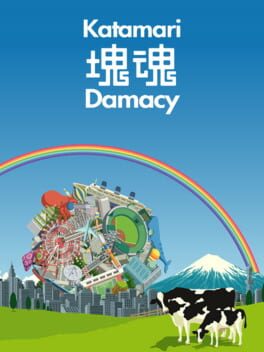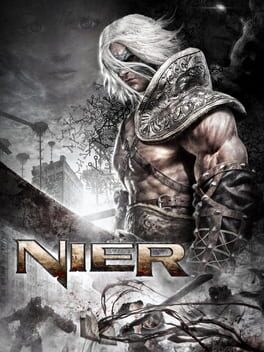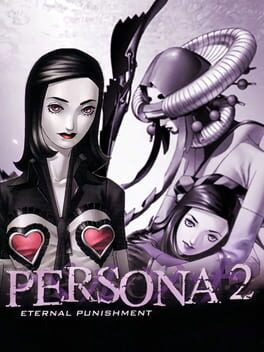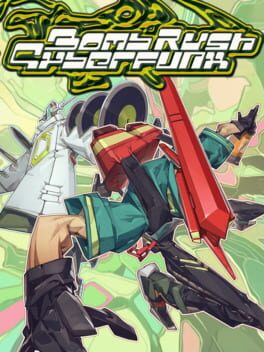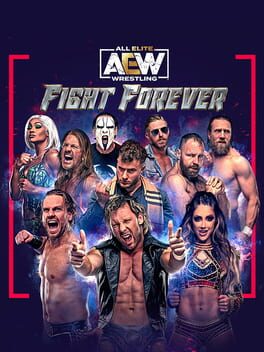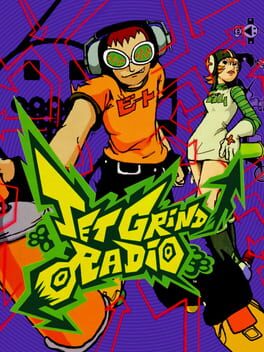handsomezack
Bio
I'm like one of those "I was born in the wrong generation" kids, except for traditionally drawn anime and affordable Sega Saturn games instead of Pink Floyd and The Beatles or whatever.
I'm like one of those "I was born in the wrong generation" kids, except for traditionally drawn anime and affordable Sega Saturn games instead of Pink Floyd and The Beatles or whatever.
Badges

GOTY '23
Participated in the 2023 Game of the Year Event

Donor
Liked 50+ reviews / lists

Pinged
Mentioned by another user

GOTY '22
Participated in the 2022 Game of the Year Event

Liked
Gained 10+ total review likes

Best Friends
Become mutual friends with at least 3 others

Gamer
Played 250+ games

Noticed
Gained 3+ followers

N00b
Played 100+ games

2 Years of Service
Being part of the Backloggd community for 2 years
Favorite Games
492
Total Games Played
000
Played in 2024
228
Games Backloggd
Recently Reviewed See More
Of the handful of attempts various indie devs have made at creating a spiritual successor to the Jet Set Radio series, Team Reptile is the first one to get it right with Bomb Rush Cyberfunk. The game was probably my most anticipated game of 2023, and it definitely delivered. It really does feel like you’re playing a sequel to Jet Set Radio Future. I’ll mainly be comparing it to Future, as the original Jet Set/Grind Radio is a much different type of game, focusing on arcadey levels and high scores rather than a fast-paced interconnected world that encourages exploration.
BRC excels in some places compared to JSRF. There are some excellent ideas that made their way into this game that JSRF would have definitely benefited from. That being said, BRC also comes up short in other areas, so I’m going to pick apart the game piece by piece and give my thoughts regarding how it stacks up in each section.
I’ll start with the gameplay. The level design can be somewhat overwhelming at first, but once you start familiarizing yourself with the locations the game has to offer, they’re excellently designed. It’s immensely satisfying to discover how the levels link each area within them together through rails, billboards, street lamps, and so on in order to chain together massive trick combos and maximize your speed as you grind through each location.
The game has four different ways to traverse its world. Walking/running, skateboarding, roller skating, and biking. Walking/running borders on being completely useless. Apparently freerunning was originally going to be a big focus in the game, with Soap Shoes (or Sonic the Hedgehog) style rail grinding, but in the final game you instead immediately switch to your board/skates/bike when connecting with a rail. I think keeping this focus would’ve been a benefit, as there’s very little reason to walk unless you’re trying to stop somewhere without your momentum carrying you past where you’re trying to stop, or if you want to fight the cops that are chasing you (which is possible while skating/biking, and not really worth it anyway when you could just ride away from them). It would’ve given players a way to mix up the gameplay and offer unique ways to move, but instead it just comes across as annoying when the game forces you to stop rolling around on wheels in order to go up steps or slide through a vent. On a similar note, there’s literally no difference between skateboards, inline skates, and BMX bikes beyond the tricks you can do looking visually different. The same goes for each playable character, which contrasts with the different weights and momentums of each different character in the Jet Set Radio games. I guess this lets you play as the ones you like instead of incentivizing playing as the “best” one, but I feel BRC could have used ways to mix up how the movement felt, because there’s little reason to switch between movement methods. The movement itself is great, being fun and easy to get used to, though it’s much tighter and less momentum-based than either JSR game. This could be a good or bad thing depending on who you ask, and I’m not sure where I stand on it myself, as the clunkier gameplay of JSR can potentially be difficult to get used to, but much more satisfying to master.
The graffiti system, however, is undeniably better than either JSR game. Rather than spending time inputting several strings of joystick inputs like JSR, or simply pressing a button to immediately spraypaint a mural like in JSRF, BRC finds the perfect middle ground and has you essentially connecting dots with quick joystick inputs similar to drawing a star. It’s fast, stylish, and enjoyable. There are dozens of combinations based on which dots you connect first, offering you a giant library of art to paint at any time as opposed to having to lock in a choice of one piece of artwork for each canvas size as you would in the JSR games. It’s without a doubt the biggest improvement BRC has made over the games it was inspired by.
The story was a pleasant surprise. It’s nothing groundbreaking, and the (honestly pretty fun) plot twists are revealed in the fairly boring way of the main character randomly remembering pieces of his backstory as you beat each boss. You get to play some extremely fun dream levels for each fragment of memory though, which is really cool. It’s more than JSR/JSRF did, where the characters aren’t any deeper than a sentence or two describing them in the manual, and the story can entirely be boiled down to “the cops are corrupt, the rich are corrupt, we have to stop their evil plan” which, despite being a message I agree with, is not expanded upon. BRC is a much shorter game than either, which is unfortunate, but it uses its time much more efficiently to tell more of a story. The ending does feel a bit rushed though. I didn’t even know I was in the final area of the game until the final boss (whose first phase was recycled from earlier in the game) came out of nowhere. Room for improvement, definitely, but overall I don’t have much to complain about.
Visually, BRC is exactly what you’d expect from a JSRF sequel. The graphics and art style mimic it almost perfectly. Most JSR-esque games fail to capture the same aesthetic, but BRC hits the nail on the head. I do think the character designs are a little weaker than the original JSR, with Red, Bel, Vinyl, and Solace being the only ones to really stand out. I think like 75% or so of the JSRF redesigns were terrible though, so it’s got a leg up on Future in that regard.
The soundtrack is excellent, but I can’t say I prefer it to JSRF’s soundtrack. The pool of songs is smaller, the transitions between songs aren’t as good, and I felt a few of the songs don’t fit the vibe of the game as well as they should. This is largely down to personal preference though, and easily defendable by the fact that JSRF was made with a triple A budget. Hideki Naganuma is at his best here though, as his three songs included in BRC are leagues above the already phenomenal work he’s done in prior games.
The postgame is more or less the same as JSRF’s postgame, where there isn’t a whole lot to do beyond unlocking the rival characters and finding any collectibles you missed. There are a lot more collectibles though, and ones that I feel are more worth your while. Rather than JUST new graffiti, you also can find new “outfits” (color schemes) for your characters, as well as CDs that allow you to play specific songs whenever you want rather than having to wait for them to come on depending on which location you’re in. A lot of side characters are also easily missable or outright unobtainable until you beat the game, compared to JSRF where you’ll have most if not all of them by the time you beat the final boss. Being rewarded with a final unlockable character for tagging every graffiti spot is also a plus, as JSRF had no reward for doing so. A new game plus option would’ve been nice though, so you actually have something to do with him.
Watching the modding scene grow has also been a lot of fun. Now that I’m in the postgame, I’ve been playing as JSRF's Gum and MF DOOM and listening to a lot of my own music that I feel fits the game’s aesthetic. Not really relevant to my review of the game itself, but still something I wanted to add.
In conclusion, Bomb Rush Cyberfunk will most likely end up being my GOTY. It’s not perfect, and I don’t know if I’d recommend it over Jet Set Radio Future in a one-or-the-other scenario, but not being perfect doesn’t mean it isn’t still an incredible game. I thoroughly enjoyed it from start to finish, and encourage anyone reading this to check it out if you haven’t already. Team Reptile has yet to make a game I haven’t loved, and I’m eager to see where they go from here.
BRC excels in some places compared to JSRF. There are some excellent ideas that made their way into this game that JSRF would have definitely benefited from. That being said, BRC also comes up short in other areas, so I’m going to pick apart the game piece by piece and give my thoughts regarding how it stacks up in each section.
I’ll start with the gameplay. The level design can be somewhat overwhelming at first, but once you start familiarizing yourself with the locations the game has to offer, they’re excellently designed. It’s immensely satisfying to discover how the levels link each area within them together through rails, billboards, street lamps, and so on in order to chain together massive trick combos and maximize your speed as you grind through each location.
The game has four different ways to traverse its world. Walking/running, skateboarding, roller skating, and biking. Walking/running borders on being completely useless. Apparently freerunning was originally going to be a big focus in the game, with Soap Shoes (or Sonic the Hedgehog) style rail grinding, but in the final game you instead immediately switch to your board/skates/bike when connecting with a rail. I think keeping this focus would’ve been a benefit, as there’s very little reason to walk unless you’re trying to stop somewhere without your momentum carrying you past where you’re trying to stop, or if you want to fight the cops that are chasing you (which is possible while skating/biking, and not really worth it anyway when you could just ride away from them). It would’ve given players a way to mix up the gameplay and offer unique ways to move, but instead it just comes across as annoying when the game forces you to stop rolling around on wheels in order to go up steps or slide through a vent. On a similar note, there’s literally no difference between skateboards, inline skates, and BMX bikes beyond the tricks you can do looking visually different. The same goes for each playable character, which contrasts with the different weights and momentums of each different character in the Jet Set Radio games. I guess this lets you play as the ones you like instead of incentivizing playing as the “best” one, but I feel BRC could have used ways to mix up how the movement felt, because there’s little reason to switch between movement methods. The movement itself is great, being fun and easy to get used to, though it’s much tighter and less momentum-based than either JSR game. This could be a good or bad thing depending on who you ask, and I’m not sure where I stand on it myself, as the clunkier gameplay of JSR can potentially be difficult to get used to, but much more satisfying to master.
The graffiti system, however, is undeniably better than either JSR game. Rather than spending time inputting several strings of joystick inputs like JSR, or simply pressing a button to immediately spraypaint a mural like in JSRF, BRC finds the perfect middle ground and has you essentially connecting dots with quick joystick inputs similar to drawing a star. It’s fast, stylish, and enjoyable. There are dozens of combinations based on which dots you connect first, offering you a giant library of art to paint at any time as opposed to having to lock in a choice of one piece of artwork for each canvas size as you would in the JSR games. It’s without a doubt the biggest improvement BRC has made over the games it was inspired by.
The story was a pleasant surprise. It’s nothing groundbreaking, and the (honestly pretty fun) plot twists are revealed in the fairly boring way of the main character randomly remembering pieces of his backstory as you beat each boss. You get to play some extremely fun dream levels for each fragment of memory though, which is really cool. It’s more than JSR/JSRF did, where the characters aren’t any deeper than a sentence or two describing them in the manual, and the story can entirely be boiled down to “the cops are corrupt, the rich are corrupt, we have to stop their evil plan” which, despite being a message I agree with, is not expanded upon. BRC is a much shorter game than either, which is unfortunate, but it uses its time much more efficiently to tell more of a story. The ending does feel a bit rushed though. I didn’t even know I was in the final area of the game until the final boss (whose first phase was recycled from earlier in the game) came out of nowhere. Room for improvement, definitely, but overall I don’t have much to complain about.
Visually, BRC is exactly what you’d expect from a JSRF sequel. The graphics and art style mimic it almost perfectly. Most JSR-esque games fail to capture the same aesthetic, but BRC hits the nail on the head. I do think the character designs are a little weaker than the original JSR, with Red, Bel, Vinyl, and Solace being the only ones to really stand out. I think like 75% or so of the JSRF redesigns were terrible though, so it’s got a leg up on Future in that regard.
The soundtrack is excellent, but I can’t say I prefer it to JSRF’s soundtrack. The pool of songs is smaller, the transitions between songs aren’t as good, and I felt a few of the songs don’t fit the vibe of the game as well as they should. This is largely down to personal preference though, and easily defendable by the fact that JSRF was made with a triple A budget. Hideki Naganuma is at his best here though, as his three songs included in BRC are leagues above the already phenomenal work he’s done in prior games.
The postgame is more or less the same as JSRF’s postgame, where there isn’t a whole lot to do beyond unlocking the rival characters and finding any collectibles you missed. There are a lot more collectibles though, and ones that I feel are more worth your while. Rather than JUST new graffiti, you also can find new “outfits” (color schemes) for your characters, as well as CDs that allow you to play specific songs whenever you want rather than having to wait for them to come on depending on which location you’re in. A lot of side characters are also easily missable or outright unobtainable until you beat the game, compared to JSRF where you’ll have most if not all of them by the time you beat the final boss. Being rewarded with a final unlockable character for tagging every graffiti spot is also a plus, as JSRF had no reward for doing so. A new game plus option would’ve been nice though, so you actually have something to do with him.
Watching the modding scene grow has also been a lot of fun. Now that I’m in the postgame, I’ve been playing as JSRF's Gum and MF DOOM and listening to a lot of my own music that I feel fits the game’s aesthetic. Not really relevant to my review of the game itself, but still something I wanted to add.
In conclusion, Bomb Rush Cyberfunk will most likely end up being my GOTY. It’s not perfect, and I don’t know if I’d recommend it over Jet Set Radio Future in a one-or-the-other scenario, but not being perfect doesn’t mean it isn’t still an incredible game. I thoroughly enjoyed it from start to finish, and encourage anyone reading this to check it out if you haven’t already. Team Reptile has yet to make a game I haven’t loved, and I’m eager to see where they go from here.
It's the only wrestling game where you can play as Eddie Kingston, so it's automatically a good game.
Kinda lacking in content for now, but the gameplay is extremely fun and easy to learn. Definitely not a perfect game, but enjoyable enough that it'll likely be my go-to for the forseeable future when I want to play a wrestling game.
Kinda lacking in content for now, but the gameplay is extremely fun and easy to learn. Definitely not a perfect game, but enjoyable enough that it'll likely be my go-to for the forseeable future when I want to play a wrestling game.
With Bomb Rush Cyberfunk around the corner, I figured I owed both JSR games a replay. I've played through this one twice before, once on PS3 and once on PC, but since I own a Dreamcast I figured I'd play it on my CRT this time.
I think the "bad controls" that I'm seeing in other reviews and hearing elsewhere online are a little overstated. It's probably been a decade since I last played JSR, and this replay made me realize the game is certainly rough around the edges and takes some getting used to. Your momentum can often work against you and the camera controls are downright terrible (in the Dreamcast version; the PC/PS3/360 ports let you use the other analog stick to control the camera). That being said, it didn't take long for me to get the hang of things and start having a blast with the game. The music, art style, and general aesthetics are just as good as everyone says. In some ways I'd say they're better than Jet Set Radio Future, despite Future being an overall improvement and better game. The arcadey gameplay loop is fun and very replayable. I can see myself starting a NG+ in the near future to go back and collect all the graffiti souls and secret characters while I wait to replace my dead Xbox in order to replay Future. JSR is everything I love about 90s Sega arcade games, despite it technically not being one. If you stumbled upon this review and haven't played it, definitely give it a shot. I'd just recommend playing it on PC if you're not someone like me who's willing to deal with the flaws of the original for the sake of actually playing on the Dreamcast. The few missing music tracks from the port really aren't worth the tradeoff of the original's camera controls.
I think the "bad controls" that I'm seeing in other reviews and hearing elsewhere online are a little overstated. It's probably been a decade since I last played JSR, and this replay made me realize the game is certainly rough around the edges and takes some getting used to. Your momentum can often work against you and the camera controls are downright terrible (in the Dreamcast version; the PC/PS3/360 ports let you use the other analog stick to control the camera). That being said, it didn't take long for me to get the hang of things and start having a blast with the game. The music, art style, and general aesthetics are just as good as everyone says. In some ways I'd say they're better than Jet Set Radio Future, despite Future being an overall improvement and better game. The arcadey gameplay loop is fun and very replayable. I can see myself starting a NG+ in the near future to go back and collect all the graffiti souls and secret characters while I wait to replace my dead Xbox in order to replay Future. JSR is everything I love about 90s Sega arcade games, despite it technically not being one. If you stumbled upon this review and haven't played it, definitely give it a shot. I'd just recommend playing it on PC if you're not someone like me who's willing to deal with the flaws of the original for the sake of actually playing on the Dreamcast. The few missing music tracks from the port really aren't worth the tradeoff of the original's camera controls.
